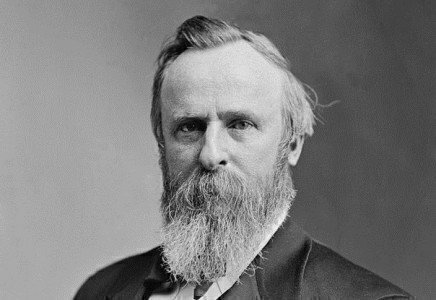Today marks the birthday of one of the most controversial Presidents, Rutherford B. Hayes, who took office amid a constitutional crisis and left office defending his reputation.
Historians rank Hayes in the middle of the pack when it comes to overall performance in office, but Hayes’ legacy will be forever linked to how he was elected.
In 1876, Hayes was a Civil War hero and Ohio governor who was selected as a dark horse candidate by the Republicans, instead of another controversial figure, James Blaine.
The Democratic contender, Samuel Tilden of New York, was widely expected to win the general election against Hayes, because the nation had been in crisis under the outgoing Republican president, Ulysses S. Grant.
However, when Election Day came, neither candidate had a majority of the electoral votes. Tilden had easily won the popular vote, but he needed one more electoral vote.
However, in four states, each party claimed that their candidate had won the state, which obviously could not be true. If the Democratic reports of the election were accepted, Tilden would be the President. If the Republican reports were accepted, Hayes would be the President.
The Constitution didn’t account for this scenario: There was no provision for settling a dispute involving rival electors. An additional problem was that the Vice President needed to certify the election. But Henry Wilson had died a year earlier, and there was no sitting Vice President.
A special Electoral Commission of Senators, House members, and Supreme Court justices was appointed by Congress to settle the dispute and avert a constitutional crisis before March, when a new president was supposed to take office.
The commission awarded all of the electoral votes of the four disputed states to Hayes in an 8-7 vote. The Democrats allegedly agreed to the decision in exchange for the withdrawal of federal troops from South Carolina and Louisiana, marking the end of Reconstruction in the South, in what is called the Compromise of 1877.
The second part of Hayes’ legacy was the fallout from Reconstruction’s end and the subsequent enactment of Jim Crow laws mandating racial segregation in the South. Hayes did remove the last federal troops from the South, which has hurt his reputation with some historians. But others said Hayes had no choice, and most federal troops had already left the South during the Grant administration.
After his controversial election, Hayes promised not to run for re-election, and he kept that promise, helping to restore the nation’s faith in the office of the presidency. He went on to attack patronage in the nation’s civil service system. Hayes succeeded in firing the powerful Collector of the Port of New York, Chester Arthur, in 1878, in an epic battle with New York power broker Roscoe Conkling. (Arthur would become President in 1881.) Under Hayes, the American economy also recovered from the disastrous Panic of 1873.
Today, Hayes is little remembered in the United States, but he is treated as a national hero in one nation: Paraguay. Hayes agreed to negotiate a long-held border dispute between Argentina and Paraguay, and the decision gave Paraguay 60 percent of its land.
So if you go to Paraguay, there is a state named after the 19th President called Presidente Hayes. The region celebrates Presidente Hayes day on November 12 annually and even has a soccer team named for Hayes as well as a Hayes museum for visitors.
Scott Bomboy is the editor-in-chief of the National Constitution Center.







